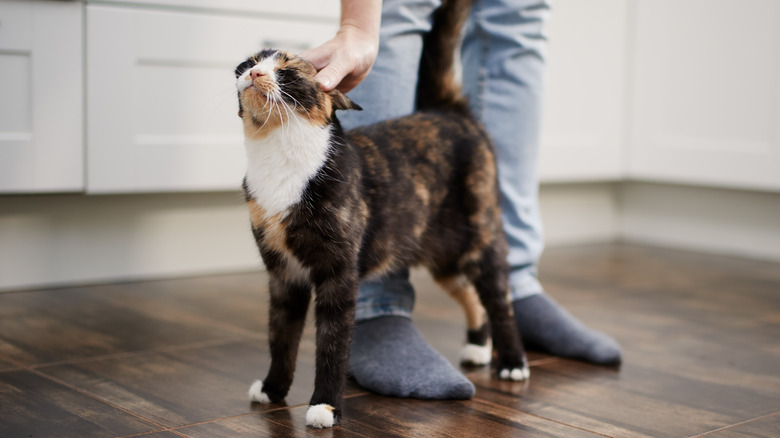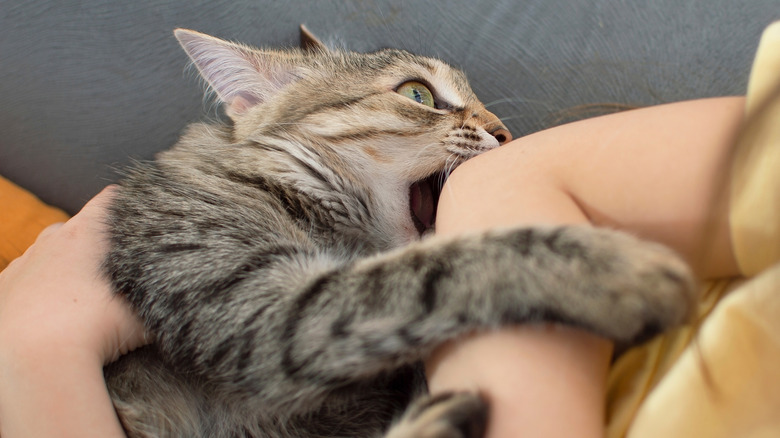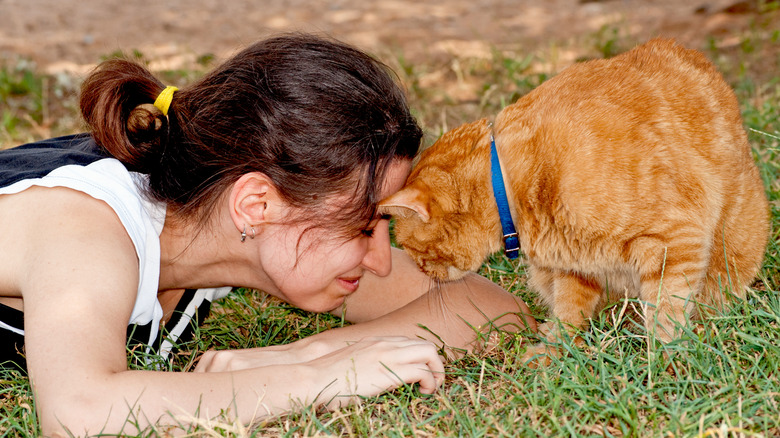Weird Ways Cats Say 'Thank You' To Us
Dogs are renowned for being loving and loyal to their owners, while all too often, cats get viewed as aloof and uncaring. The truth is that cats can be fiercely devoted to their human companions, but these furry little weirdos show their gratitude and affection in ways we sometimes misunderstand. The onus should be on us, then, to learn to correctly interpret their loving actions, body language, and vocalizations.
Whenever a cat brings home a dead animal, many pet owners freak out, not recognizing the mouse or bird as the gift that the cat intends it to be. The cat is trying to say "thank you" or "I love you" by sharing a meal with you and perhaps even attempting to teach you how to hunt, the way a mother cat educates her kittens. Similarly, an indoor cat may present you with a beloved toy as a substitute for the gift of a dead prey animal.
When your cat licks you, that little sandpaper tongue can feel uncomfortable, especially when the target of the enthusiastic licking is your eyelids or hair. However, this grooming behavior demonstrates that your cat cares about you and wants to mark you as part of its social group.
Other odd ways cats may show gratitude and affection
A cat might knead its favorite human as a demonstration of thankfulness and love. This "making biscuits" on your chest or thighs can be painful, given the sharpness of a cat's claws, and it definitely ruins delicate clothing, but kneading is an extremely positive feline behavior. The soothing repetitive action helps a cat relax and show love while creating a cozy nest filled with its own pheromones — thanks to the scent glands in the paws — and it may remind the cat of the peaceful days when it was a nursing kitten, kneading its mother to stimulate the flow of milk.
A cat that puts its butt in your face, similarly, is paying you a great compliment, demonstrating how much it loves and trusts you. Unfortunately, it's a message many people misinterpret — most likely because it involves a close-up view of a furry derriere. Love bites are sometimes signs of feline affection, though these gentle bites may quickly escalate into real bites that break the skin. The key is to learn your cat's specific body language so you can distinguish between a love bite that indicates "play with me more" versus one that says "stop playing with me now."
Cute ways cats convey 'thank you' and 'I love you'
Cat bunting (also known as headbutting) is one of the sweeter ways that your pet may be communicating love and gratefulness. Cat faces have many scent glands, so when a cat rubs its face on you, it's depositing its pheromones and marking you as a beloved member of the family. Common cat noises, such as purring, trilling, chirping, and meowing, can also be signs of affection. These feline vocalizations can express everything from "hello" and "feed me" to "thank you" and "I love you." Your cat may also be sending you positive messages by following you around the house or curling up to sleep near you.
One sign of feline affection that humans frequently misunderstand — or don't even notice — is a cat's slow blinking. Direct eye contact followed by a deliberately slow blink indicates love, trust, and relaxation. When your cat gives you a slow blink, mirror the loving message by doing a slow blink in return.
Also commonly misunderstood is the "tummy trap." A cat may expose its belly to you to signal trust, affection, and gratitude, but far too many people interpret this enticing fuzzy kitty tummy as a request for a belly rub. While it's true that some cats do enjoy belly rubs, an exposed tummy is more likely your cat's way of indicating it trusts you so completely that it feels comfortable exposing its vulnerable stomach area to you. It's worth taking the time to learn to interpret your kitty's individual quirks so you can say "thank you" and "I love you" back in ways your pet can understand.


